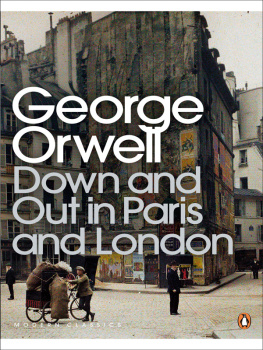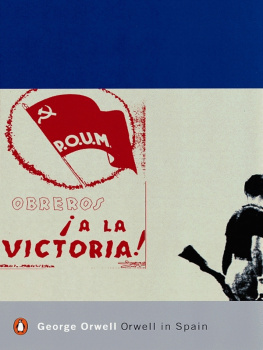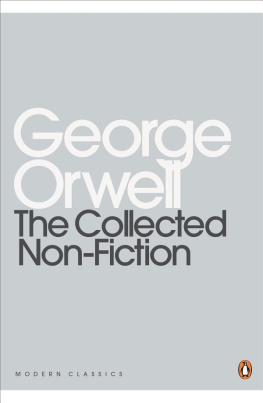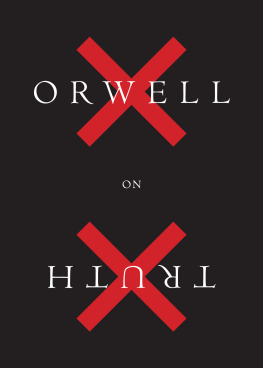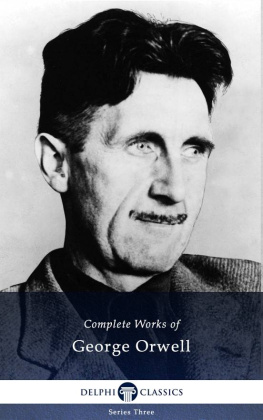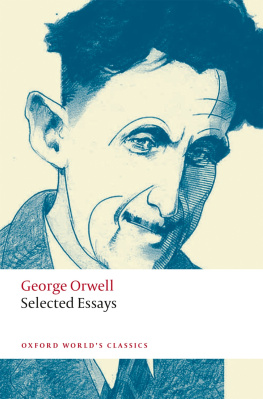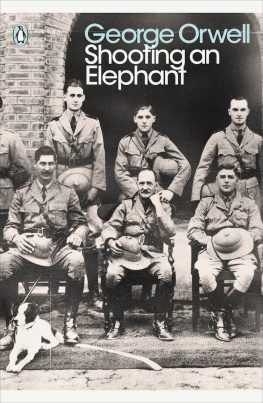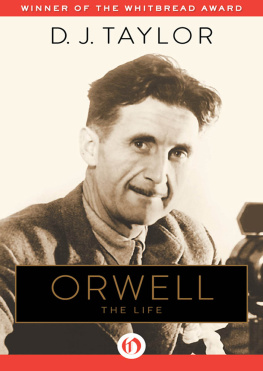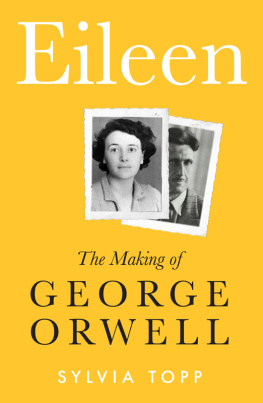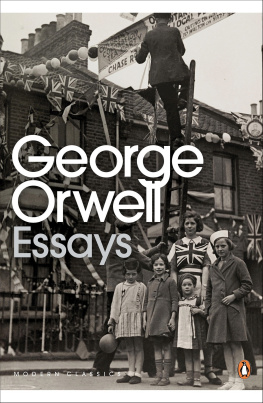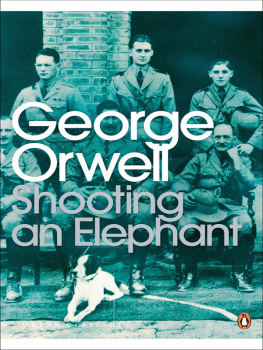PENGUIN BOOKS
Down and Out in Paris and London
Eric Arthur Blair (George Orwell) was born in 1903 in India, where his father worked for the Civil Service. The family moved to England in 1907 and in 1917 Orwell entered Eton, where he contributed regularly to the various college magazines. From 1922 to 1927 he served with the Indian Imperial Police in Burma, an experience that inspired his first novel, Burmese Days (1934). Several years of poverty followed. He lived in Paris for two years before returning to England, where he worked successively as a private tutor, schoolteacher and bookshop assistant, and contributed reviews and articles to a number of periodicals. Down and Out in Paris and London was published in 1933. In 1936 he was commissioned by Victor Gollancz to visit areas of mass unemployment in Lancashire and Yorkshire, and The Road to Wigan Pier (1937) is a powerful description of the poverty he saw there. At the end of 1936 Orwell went to Spain to fight for the Republicans and was wounded. Homage to Catalonia is his account of the civil war. He was admitted to a sanatorium in 1938 and from then on was never fully fit. He spent six months in Morocco and there wrote Coming Up for Air. During the Second World War he served in the Home Guard and worked for the BBC Eastern Service from 1941 to 1943. As literary editor of Tribune he contributed a regular page of political and literary commentary, and also wrote for the Observer and later for the Manchester Evening News. His unique political allegory, Animal Farm, was published in 1945, and it was this novel, together with Nineteen Eighty-Four (1949), which brought him world-wide fame.
George Orwell died in London in January 1950. A few days before, Desmond MacCarthy had sent him a message of greeting in which he wrote: You have made an indelible mark on English literature you are among the few memorable writers of your generation.
Peter Davison is Research Professor of English at De Montfort University, Leicester. He was born in Newcasde upon Tyne in 1926 and studied for a London External BA (1954) by correspondence course. He edited an Elizabethan text for a London MA (1957) and then taught at Sydney University, where he gained a Ph.D. He was awarded a D. Litt. and an Hon. D. Arts by De Montfort University in 1999. He has written and edited fifteen books as well as the Facsimile Edition of the manuscript of Nineteen Eighty-Four and the twenty volumes of Orwells Complete Works (with Ian Angus and Sheila Davison). He is a Past-President of the Bibliographical Society, whose journal he edited for twelve years. He was made an OBE in 1999 for services to literature.
Dervla Murphy has spent much of her life travelling. As well as her many travel books she is also the author of A Place Apart: Northern Ireland, which deals with the conflict in Northern Ireland and won the 1978 Christopher Ewart-Biggs Memorial Prize, Race to the Finish, an account of the nuclear controversy, and Wheels Within Wheels, her autobiography.
Introduction
Starting as a schoolboy, Eric Blair quietly followed his own star. It was assumed that Collegers (the Kings Scholars, Etons intellectual lite) would try for Oxford or Cambridge and probably succeed. But Eric didnt try. His family had forced him to work hard at a dreary prep school to win an Eton scholarship, and he was not interested in further mental exertion unrelated to his private ambition. At the beginning of Why I Write (1947), he explains that from the age of five or six he knew he would be must bea writer. For those lucky enough thus to identify their star in childhood, the only indispensable training is to read, widely and attentively. But English literature was not a major subject at Eton, where most boys came from backgrounds either irremediably unliterary or so literary that formally to teach them English literature would be absurd. Many years later Erics tutor, Andrew Gow, declared that his by then famous pupil had done absolutely no work for five years. This was untrue; Eric had diligently apprenticed himself to those masters of English prose who most appealed to himincluding, significantly, Swift, Sterne and Jack London. In The Road to Wigan Pier he tells us: At the age of seventeen or eighteen I had read and re-read the entire published works of Shaw, Wells and Galsworthy (at that time still regarded as dangerously advanced writers) However, he was supposed to have been studying History and Classics and in his final Eton July examinations he came 138th out of 167.
The disappointed Blair family would have been unimpressed had their only son then announced his ambition; in every generation thousands of youngsters want to write and so far Eric had shown no trace of literary talent. Anyway, what could he write about? Ones first eighteen years rarely provide either the material or the inspiration (at that stage) for saleable writing. And, having neglected to win a university scholarship, Eric had at once to earn his living. So off he went to Burma, to spend five lonely but profoundly educational years in the Indian Imperial Police. His mothers family had been settled in Burma for generations and his father, too, had served there as a middle-ranking officer in the unposh Opium Department of the Government of India. (Despite Victorian values, the opium trade with China had been legalised in 1860 as a British Government monopoly.)
Readers of Burmese Days will know how strongly Orwell reacted against imperialism in action. He was never sentimental or starry-eyed about the Burmese; that would have been totally out of character. But he could not accept that what he saw as Burmese racial weaknesses justified Burmas relentless exploitation by Britain. In 1927 he resigned from the Indian Imperial Police, much to his familys baffled exasperation. Nor were their feelings soothed by his admission that he intended to be a writer.
Orwells savings proved that he had led an unusually solitary and frugal life in Burma, reading rather than boozing at the Club, yet they represented only a flimsy life-jacket when he plunged into the deep cold waters of the literary world. Where, for instance, was he to live? Eventually a family acquaintance found him a grotty bedroom in a mean street off the Portobello Road and there he settled down, at the age of twenty-four, to teach himself how to write. His neighbours were impressed by his determination. Week after week he remained in his cramped, unheated bedroom, thawing his hands over a candle when they became too numb to write. Clearly he was prepared to endure any amount of hardship for the sake of learning how to use the English language as effectively as he could.
Writers may be born not madeborn, that is, with the will to write. But, for many, even modest success has to be worked for throughout long bleak years littered with rejection slips. In our day this fact is often obscured, to an extent that would have appalled Orwell, by the ease with which semi-literate but efficiently-hyped authors can become famousand rich. Orwell never thought of his work primarily as a cash-source; many of his best essays were written for the Tribune, which always paid poorly and sometimes paid nothing. As his biographer Bernard Crick has noted, He genuinely valued art more than success. In consequence, he was his own harshest critic. Sending the manuscript of A Clergymans Daughter to his agent, he sadly remarked: It was a good idea, but I am afraid I have made a muck of it. Another hallmark of the born writer was his conviction that those who habitually discuss their writing produce little of worth. And his early dedication to his craft never waned. Fame, when it belatedly came, did not tempt him to demand less of himself as a writer. In Orwells case the style was indeed the man, as T. S. Eliot recognised when he referred to his good writing of fundamental integrity.

